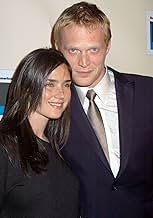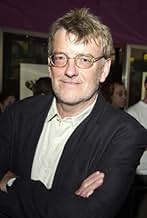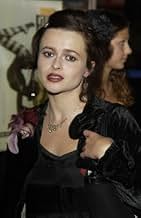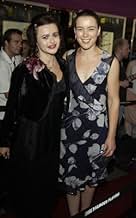IMDb RATING
6.5/10
2.9K
YOUR RATING
1930's London. Two sisters - Madeleine and Dinah - One marries Rickie, the other falls in love with him. He begins an affair which is to have repercussions throughout their lives.1930's London. Two sisters - Madeleine and Dinah - One marries Rickie, the other falls in love with him. He begins an affair which is to have repercussions throughout their lives.1930's London. Two sisters - Madeleine and Dinah - One marries Rickie, the other falls in love with him. He begins an affair which is to have repercussions throughout their lives.
- Director
- Writers
- Stars
- Awards
- 3 wins & 1 nomination total
- Director
- Writers
- All cast & crew
- Production, box office & more at IMDbPro
6.52.8K
1
2
3
4
5
6
7
8
9
10
Featured reviews
6=G=
"The Heart of Me" could use some CPR
"The Heart of Me" is an excellent film in all respects except one. The pathos soaked story, which moves like a lavalamp, shows us nothing new and does it such a way we are not the least inclined to care. The film traces the life of two English sisters who have a man in common. One is his wife amd the other his mistress. A painfully tedious and stilted film which presents us with such a mawkish protag (Bettany) he can't pick one or the other or manage either much less both. Rather, he lets them manage him resulting in one really whipped dude and a whole lot of crying while we sit watching disconnected and detached. A melancholy affair, "The Heart of Me" is a very pretty flop. (C+)
A beautiful, heartbreaking film
A movie full of dramatic irony and beauty. I love Helena Bonham Carter and Paul Bettany. On screen, the characters are so believable that I forget that I am watching a movie. I'm transported to this world of war and snobbery, kite flying and poetry. And every twist in the plot basically rips my heart out or sends it soaring. It's so different from any other romance film that I've ever seen. The premise is familiar, but it's beautifully done. Definitely worth seeing. Keep a box of tissues nearby. This movie made me want to read more William Blake. Watch it, and you'll see why. Seriously. It is a film that grips the heart, wraps up the senses, and causes emotions to boil. Despite the poetry in the film, it is mainly a movie of action, of eyes, beautiful, intense eyes. See this movie.
A wonderful film that goes for substance over style.
I was fortunate enough to see this film at the Toronto Film Festival and talk briefly with the Director afterwards.
"The Heart of Me" is a period piece set in London during the 1930s and 40s. It is a European-style film that takes the time to give exposition and background to the characters. It builds slowly and chooses substance over style. The mood is somber and much of the lighting and colour scheme reflects this in a similar manner to the Crow.
It is a drama with a few moments of levity. The three main leads are excellent. Helena Bonham Carter and Olivia Williams play sisters. Helena's character begins to fall in love with her brother-in-law played by Paul Bettany and they have an affair.
I was pleasantly surprised by Paul's acting. I've only seen him before in "A Knight's Tale" and "A Beautiful Mind" where he has played light-hearted best friend characters. His performance here was understated, subdued, and a change of pace from what I had previously seen. I didn't think he was capable of going head to head with Helena but he was.
If you like Merchant and Ivory films, then I think you would like this. It has the same feel as "Howard's End" and "Remains of the Day".
"The Heart of Me" is a period piece set in London during the 1930s and 40s. It is a European-style film that takes the time to give exposition and background to the characters. It builds slowly and chooses substance over style. The mood is somber and much of the lighting and colour scheme reflects this in a similar manner to the Crow.
It is a drama with a few moments of levity. The three main leads are excellent. Helena Bonham Carter and Olivia Williams play sisters. Helena's character begins to fall in love with her brother-in-law played by Paul Bettany and they have an affair.
I was pleasantly surprised by Paul's acting. I've only seen him before in "A Knight's Tale" and "A Beautiful Mind" where he has played light-hearted best friend characters. His performance here was understated, subdued, and a change of pace from what I had previously seen. I didn't think he was capable of going head to head with Helena but he was.
If you like Merchant and Ivory films, then I think you would like this. It has the same feel as "Howard's End" and "Remains of the Day".
A moving and beautifully acted piece of real cinema
This film played to a packed audience at the closing night of the London Film Festival last week. The story of an upper class English man falling passionately in love with his wife's sister was so involving I completely forgot myself for the duration of the film (and from what I could see,so did the rest of the audience). It is a flawless film. Intensely moving. The complex characterisations were handled with immense integrity. One of the wonderful things about it was that during the course of the story I both liked and disliked all the characters. By the end it is impossible to judge them, only appreciate what they had gone through. A most wonderful and uplifting film. Paul Bettany is a discovery. An actor of immense subtlety who is not afraid to play a character who appears simply weak on the surface but is actually very complex. A very detailed and brave performance. Olivia Williams is transformed by the character. She plays Madeline, a woman who lives by the strict rules of her class. No emotion is allowed to get in the way of how this class organises their lives and Madeline respects that. When we see her years later in life, Williams makes us utterly believe the immense changes that she has endured. Madeline must forgive her sister Dinah for her betrayal. This seems impossible given what Madeline has endured at the hands of her sister, yet Williams makes us believe in that forgiveness. This was a great lesson to me. To see how you must move on in your life. Helena Bonham Carter is more vulnerable, sensitive and outrageous than I have ever seen her. Her character is on a knife edge. She falls passionately in love with her brother- in- law and from that moment on the film takes you on an emotional roller-coaster ride that I still can't get out of my mind. The film also has one of the best scores I've heard in ages - romantic and tuneful without being slushy or sentimental. It's also a ravishing looking film (maybe that's why I cant get it out of my mind) and yet the powerful images never interfere with the story but add to it all the time. Real cinema.
Betrayal
This exquisitely crafted film is much better than what we have heard it was. The film has an incredible texture, but of course, it's not for everyone. Director Thaddeus O'Sullivan presents this story of love and betrayal with a style that is surprising. The material in which this film is based is the novel by Rosamond Lehmann, that shows a slice of the life in London among the upper classes in the 30s, prior to WWII and adapted for the screen by Lucinda Coxon.
The story of this love triangle involves Madeleine, a young society matron, married to Rickie, a successful bank executive. They entertain lavishly; it's obvious they know the right people, as it shows in their lavish parties. Dinah, Madeleine's sister is a loose cannon. She is a young woman who couldn't care less about being int the right places, or to mix with the right crowd.
Dinah and Rickie begin an affair. Rickie agonizes about the situation and how to handle it. Madeleine never gets a hint until Rickie reveals his intention of leaving her. Madeleine, without Rickie will lose it all, her status in society and all the other little perks. But she is not prepared to accept the idea that Dinah is the one who has lured Rickie away from her. The relationship among the three principals will never be the same.
Helena Bonham Carter plays Dinah with abandon. She's a no nonsense actress and she clearly gets into her character's skin. Olivia Williams is a staid and shocked Madeleine. Ms Williams is a beauty that epitomizes the type of English society woman naturally. Paul Bettany is convincing as Rickie, the man torn between love and duty. Eleanor Bron makes an excellent Mrs. Burkett.
The story of this love triangle involves Madeleine, a young society matron, married to Rickie, a successful bank executive. They entertain lavishly; it's obvious they know the right people, as it shows in their lavish parties. Dinah, Madeleine's sister is a loose cannon. She is a young woman who couldn't care less about being int the right places, or to mix with the right crowd.
Dinah and Rickie begin an affair. Rickie agonizes about the situation and how to handle it. Madeleine never gets a hint until Rickie reveals his intention of leaving her. Madeleine, without Rickie will lose it all, her status in society and all the other little perks. But she is not prepared to accept the idea that Dinah is the one who has lured Rickie away from her. The relationship among the three principals will never be the same.
Helena Bonham Carter plays Dinah with abandon. She's a no nonsense actress and she clearly gets into her character's skin. Olivia Williams is a staid and shocked Madeleine. Ms Williams is a beauty that epitomizes the type of English society woman naturally. Paul Bettany is convincing as Rickie, the man torn between love and duty. Eleanor Bron makes an excellent Mrs. Burkett.
Did you know
- TriviaThe poem read by Dinah (Helena Bonham Carter) in the park is Broken Love, written by William Blake.
- GoofsAll entries contain spoilers
- Crazy creditsThanks to the residents of Fitzroy Square.
- SoundtracksThe Very Thought of You
Written by Ray Noble
Performed by Al Bowlly with Ray Noble and His Orchestra
Published by Campbell Connelly & Co., Ltd.
By arrangement with Past Perfect Vintage Music
- How long is The Heart of Me?Powered by Alexa
Details
Box office
- Budget
- $7,000,000 (estimated)
- Gross US & Canada
- $196,067
- Opening weekend US & Canada
- $21,956
- Jun 15, 2003
- Gross worldwide
- $282,519
- Runtime
- 1h 36m(96 min)
- Color
- Sound mix
- Aspect ratio
- 1.85 : 1
Contribute to this page
Suggest an edit or add missing content




































